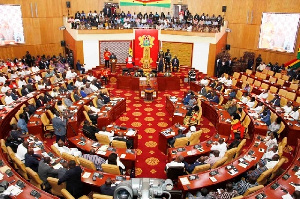Politics of Saturday, 10 July 2021
Source: rainbowradioonline.com
2021-07-10
 Parliament has been advised to address the fundamental deficiencies in Article 71
Parliament has been advised to address the fundamental deficiencies in Article 71
The Prof. Ntiamoah Baidu Committee has recommended to Parliament to as a matter of urgency, enact an Act to operationalize and address the fundamental deficiencies in Article 71.
The committee as part of its recommendations noted that Parliament must exact the Act pending a constitutional review.
The committee said it identified several areas regarding the interpretation of the provisions of Article 71 of the constitution.
These areas the committee recommended require clarity to enhance effectiveness and efficiency.
It said these areas have been raised by previous committees but remain unresolved.
The committee noted that both the Ewurama Addy and Edu-Bandoh committees made a similar recommendation that Article 71 is vague and inadequate in many respects and subject to varying interpretations.
“For example, there still remains controversy over the four-year cycle for the establishment of PCEs and there is a clear need for proper interpretation of Article 71 to settle this matter. The current practice where every President establishes a Committee for his term is not the most efficient and has a high likelihood of inconsistency in the recommendations of the different PCEs. Other challenges relate to the analogous positions established in the constitution and how they affect pensions for these positions. A legislation that provides detailed guidelines for implementing the Article will help to clarify these issues,” it added.
The committee further recommended that the approved recommendations of the PCEs should be enacted into an Act of Parliament.
It was the position of the committee that incorporating the approved recommendations into law will make the recommendations binding and easier to enforce.
“It will also take the issue of implementation out of the discretion of a sitting government and halt the current practice of selective implementation. More importantly, translating the approved recommendations into an Act of Parliament will help to avoid the controversy that occasionally emerges over the approval or non-approval of reports and the difficulty in obtaining the essential records of the approvals. A good example is the status of the Chinery Hesse report of 2008 and the recommendations. The Majority in Parliament at the time insists that the report was approved; the Minority says otherwise. This sort of controversy arises out of the opaqueness inherent in the approval process.”